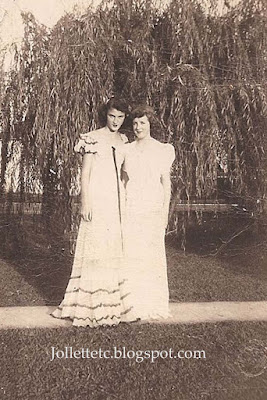Sepia Saturday challenges bloggers to share family
history through old photographs.
For every family historian and genealogist, this week’s
Sepia Saturday photo of a tree is the iconic symbol of “the family tree” with
its roots to the past holding firm, its numerous branches spreading out in all
directions, and its individual leaves added anew every year. The title of this
post might then make you think you’re in for a snoozefest through the Slade
lineage. Not so.
Here is the only photo I have of my father’s paternal grandmother,
Mary Morrison Slade. She is standing in front of a Weeping Willow tree in the
front yard of my grandparents’ home in the community called Cradock in
Portsmouth, Virginia.
Even though she died when I was 8, I have no memory of
her. She was probably extremely
debilitated by dementia and therefore my parents kept me from her. Apparently she had been that way for many
years. My dad said that even as a young man he often had to break a date to go
look for his grandmother when she wandered and got lost.
Mary Morrison Slade was widowed at the age of 49 in 1928,
the same year my dad was born. Often I have wondered how widows managed in the
days before it was common for women to work and have their own income. In 1930, Grandma Slade was
the head of household in a house she rented on Henry Street. One son, two daughters
and one son-in-law were there too. The only one with a job was the son-in-law.
In 1940 Mary was living at 416 Randolph Street. According to the 1940 census, this was the
same house where she lived in 1935, which tells me she had moved there between
1930 and 1935. Maybe the move was driven by finances because the house she
rented in 1930, just a street away, was $20 a month. The “new” house, which she
rented for $11 a month, was next door to her sister Effie and her husband Henry
Hanrahan.
 |
| from Wikimedia Commons This is NOT where Mary Slade worked, but it is a typical sewing project factory or workroom. |
Grandma Slade, born in Tennessee, had completed 5 years
of school. During her married life, she
was always the wife of a farmer, but now she was a working woman employed in
the government-sponsored WPA sewing project. The specific job appears to be “Iron lady,” but the handwriting in the 1940 census is
unclear. Her statement that she was unemployed
for 65 weeks prior to March 1940 contradicts the statement that she worked 52
weeks in 1939 earning $780. She claimed no other source of income.
The Work Project Administration (WPA) was part of the New
Deal effort to put people to work. The
sewing project was specifically designed for women who were considered
unemployed heads of household either because they were widowed, abandoned, or
disabled. The sewing project was the
lowest paid position, but women received training in using sewing machines. They made clothing, bedding, and supplies for
hospitals and orphanages. Grandma Slade
is the first ancestor I’ve found who was employed under the New Deal.
I do not know where Grandma Slade was living when she
posed in front of the tree in my grandparents’ yard. The Weeping Willow
certainly made a nice backdrop for photos though. On the evening of my Aunt
Betty’s music recital, she and her friend Jackie posed there too.
 |
| Jackie and Betty |
Don’t weep. There are many more stories and old photos of
trees at Sepia Saturday.
Wendy
© 2017, Wendy Mathias.
All rights reserved.


